Language Shaming Is the Cause of Broken English In Malaysia
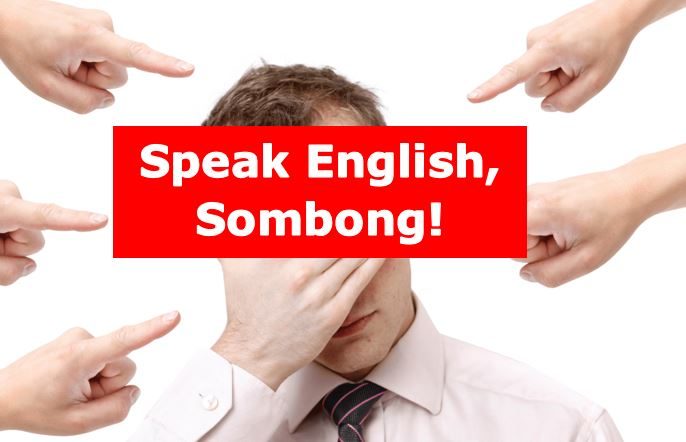 Thirsty for JUICE content? Quench your cravings on our Instagram, TikTok and WhatsApp
Thirsty for JUICE content? Quench your cravings on our Instagram, TikTok and WhatsApp
“Where were you educated, you can’t speak Bahasa at all?”
This quote from the incident involving Rais Yatim (former Minister of Information, Communication and Culture) mocking a “cakap orang puteh” (an English language speaker) journalist from The Star, is a ridiculously accurate portrayal of how English language speakers are often shamed in Malaysia.
Language shaming is what it’s called. Besides being a social issue not talked about enough, it is an attempt to shame a speaker conversing in a language that may not be a part of one’s traditional roots. “Berlagak ah! Awak ni Malaysian?” they’d scrutinise.
As Malaysians, we’d think that the video above is the only depiction of English language shaming in Malaysia. But two years ago when Fazuha accused Malays that were “speaking London” of disrespecting and disregarding their friends, convinces us even more of this social issues’ prevalence.
‘dont follow that stupid engineer’ – my mum punya respond 😌😌😌 #fazuhakaifa pic.twitter.com/0C2r5Dpt1j
— Mun (@munirahmirza) April 8, 2016
From the Chinese community’s disdain of ‘Bananarism’ (yellow on the outside, white on the inside) to just about every other major ethnicity here shaming English-speaking children for being sombong (stuck-up) and ungrateful of their family’s culture, English language-shaming has been prevalent in our country for generations.
sombong – proud, overbearing, arrogant, cocky, pompous
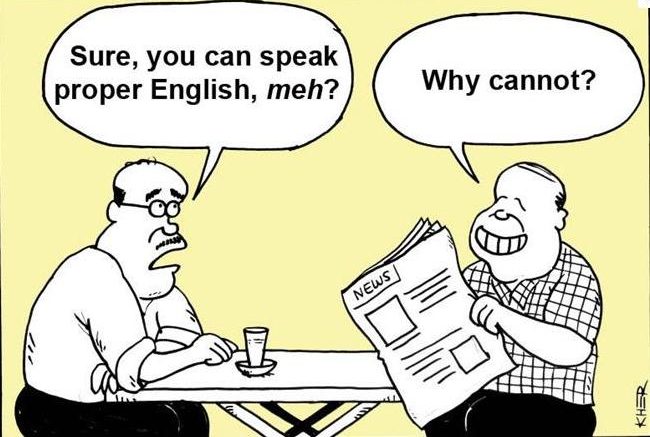
Perhaps some Malaysian’s misconception towards the English language is rooted in our struggles against our former British masters? I mean, that’s the only way to explain this hostility towards the language. When every other mother tongue gets equal treatment and gets absorb into our collective culture, the English language is relegated to urbanites and on TV where the stereotype of the ‘stuck-up’ English-speaking Malaysian is used in gags. Some people suspect that you must be eating French Fries at home too.

To lah or not to lah?

We acknowledge that Bahasa Malaysia is the national language and that it’s okay to use Manglish on the streets. But what’s wrong with using proper English (especially when asking a minister a question)? Different people from different cultures may influence those who study overseas or in international schools. But this is not the only environment where English-speakers flourish – what about the general youth who are consuming urban culture from the West?
Here’s where we talk about how you could be chilling to Joe Rogan’s podcast, deciphering Trump speeches, or laughing your ass off to The Office. Having been exposed to so much Western media, it shouldn’t come as a surprise that people may soon speak like what they have been consuming. In fact, have a walk down a trendy street in Kuala Lumpur and tell me you don’t hear lingo from the latest Netflix young adulthood series…
To call those who are labeled ‘Bananas’ or English-speakers pretentious is a shallow act. One of the reasons many Malaysians choose to study overseas is to immerse themselves in a different culture. If it’s true that English-speakers think highly of themselves, then do we still hear of friends who come back and tell us tales of Malaysians who never get out of their dorms? Or of those who stick to other Asians or Malaysians like mangoes to rice?
For some people, it’s a matter of opportunities and lack of choices due to upbringing. These people I’m referring to don’t have the chance to learn the language they should know, and are mistakenly accused of being too proud to speak any other language than English. Has it also ever occurred to certain ignorant people that some parents don’t stress on the importance of the national language at home? This video portrays a very common ‘overtly-discriminatory, anti-banana’ Malaysian situation:
There is obviously nothing wrong with sounding like a typical Malaysian when you speak English – I mean Manglish. It might not be the Queen’s English but it’s accepted here (it’s even quaint to some foreigners). So why are English-speaking Malaysians stereotyped by their fellow countrymen as either: (a) A rich kid, (b) A diplomat’s kid, or (c) Someone who hates their own culture and country?
Vision 2020: Maju Malaysia
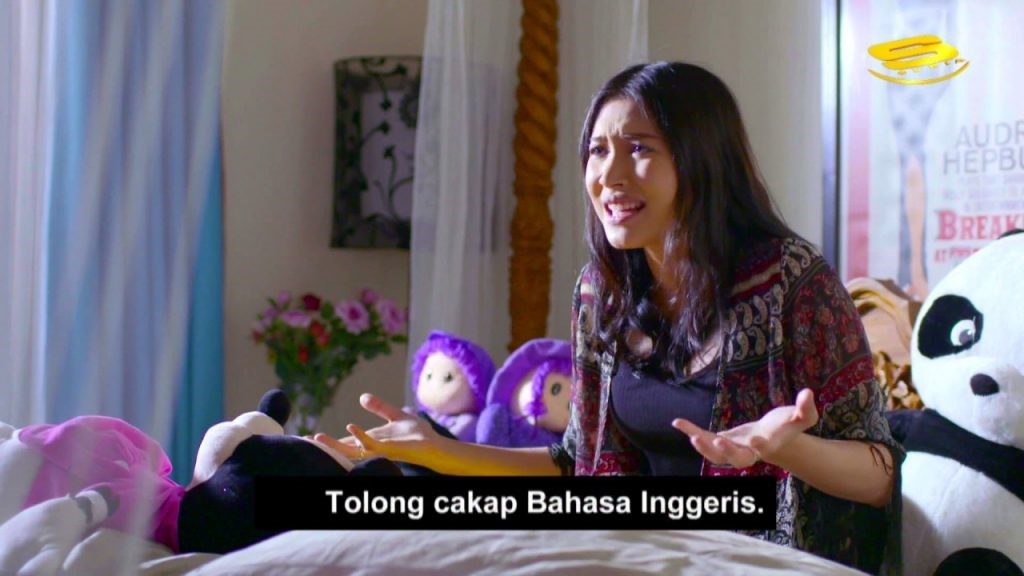
Yeah, yeah, we get it… Malaysia is known to be diverse and all. The idea of trash-talking politics in three languages at your favourite Nasi Kandar mamak is something to marvel at. While we are amazed at how colourful and interesting our Rojak language is, it’s unacceptable for some Malaysians to assume that all Malaysians must sound the same. This old-fashioned mindset disregards those who weren’t born into a typical Malaysian household, forcing every single Malaysian to fit the assigned colloquial. What absolute shite. Besides, isn’t diversity the colour of Malaysia?
Quite ironically, the government has been trying to improve the level of English in Malaysia. But when Malaysians converse in ‘angmoh’ language instead of their own mother tongue, they’re accused of not being loyal to their own language. How can the country (already so regressive in its mentality) advance and achieve Vision 2020 if we are forced to grow in an environment that renders English as unspeakable?
What more when the government has regulated the language used for official announcements to be Bahasa Malaysia. This happened just a month ago when a ridiculously written – directly translated English – notice was put up for Perak Tourism Information Centre. What happened after this spelling faux pas was not an attempt to address the country’s English proficiency. But rather, we are told to shy away from the problem by using only Bahasa Malaysia when it comes to official government announcements. We should be fixing the problem, not avoiding it.
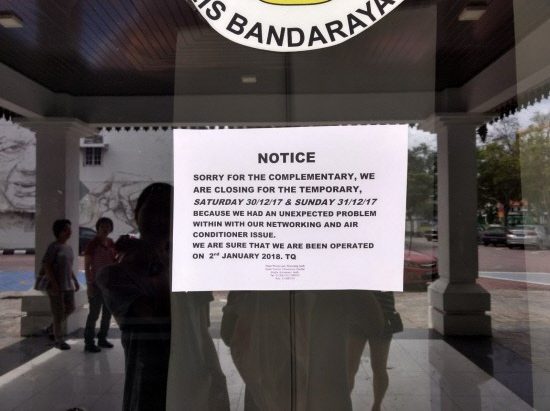
Instead of having more fluent English speakers, our society is only manifesting Foreign Language Anxiety, which is “developed from a complexity of self-perceptions, beliefs, feelings and behaviours related to the process of learning a foreign language.” It almost feels like Malaysia’s 2020 Vision is just like your ‘Gram #goals – unrealistic and unachievable. We wonder why our local fresh grads are struggling to get a job.
“One of the major things that is lacking is the ability to communicate in English,” said MEF executive director Shamsuddin Bardan to a source.
“Most of the jobs available require knowledge of English as you need to communicate with your clients or customers, especially in marketing and sales, which are normally the kind of jobs available now.
Hey adik, boleh cakap English?
Additionally, a lot of Malaysians also fail to see the opportunities of being able to converse fluently in English. While Malaysians know that English is the ‘language of the world’, we must also know that we will be left behind if such attitude and behaviour towards English language speakers still persist.
It’s time for us to be aware that future English-speaking Malaysians aren’t going anywhere because they can’t. If you think these English-speaking people are “poyo gila sial”, then you need to get your priorities straight and find worser things to insult. Why? Because we’re going places with the ability to converse in more than one language. It’s not just us English-speakers that I’m talking about, this also includes Malaysians who are eager to progress; that are not afraid to teach their kids to speak proper English so they won’t end up with a difficult future. This sure as heck involves the part of Malaysia that is not inclined to limit freedom too.
For the argument of ‘all Malaysians must speak like one’, why can’t we just let bygones be bygones, and think of English less as a ‘bahasa penjajah’. Get over it, we’ve already did our part in learning Sejarah. The language you speak is not a yardstick of patriotism. So even if you don’t speak the national language well or often, it doesn’t mean that you hate the country. English, or any other language besides your own native one, will open up opportunities. And you’re certainly not a ‘pengkhianat bangsa’ for speaking English.

When we deconstruct this bullying act against people who chooses to converse in English, it ultimately stems from a sense of inferiority. The reason some Malaysians call English speakers pretentious is not so much because these speakers are snobbish. In other words, these particular Malaysians get triggered and salty, then criticise non-native speakers for being too ‘Americanised’ because they feel inferior.
These people without an open mind will stay at their level for never wanting to change. Always remember that the language you choose to converse or communicate in is yours. Hence, I’ll say have a ‘fuck them’ mentality. Honestly, just you do you. To be aware of, and recognising this phenomenon is already the first step.
To end this piece, I’ll leave you to one particular Reddit comment from the ‘As a Malay yourself, have you met other Malays scolding you for speaking English with them?‘ thread, that perfectly captures the essence of this piece:
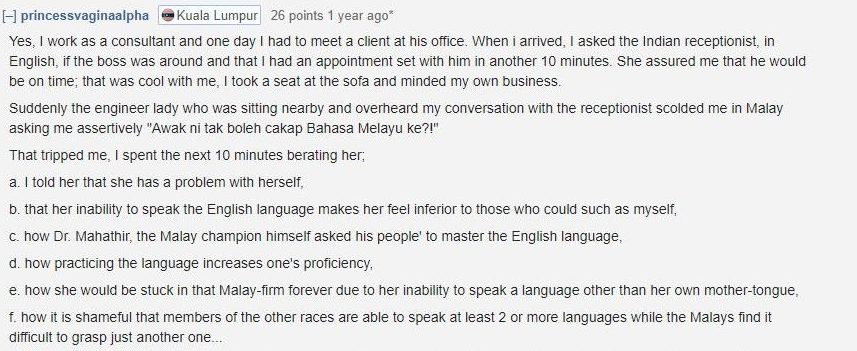
Speak English lah. For more opinionated reads, check out the Last Word section.


 Get Audio+
Get Audio+ Hot FM
Hot FM Kool 101
Kool 101 Eight FM
Eight FM Fly FM
Fly FM Molek FM
Molek FM

